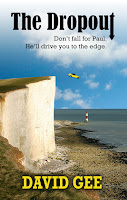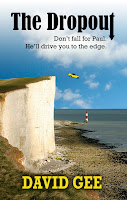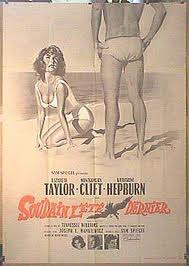Category: DavidGeeBlog
The Arab Spring fades into . . . The Arab Fall
Now for my first BAD Review!
I don’t think I would read anything else by this author and I think that the amount of sex scenes may make it an uncomfortable discussion at a book group.
Reviewed by: Nicky Hallam – Exeter
First review of THE DROPOUT
David Gee’s tongue-in-cheek, if dark, social and sexual satire (a sort of cross between David Lodge and Tom Sharpe) leads us through a topsy-turvy world of sexual shenanigans and unconventional relationships conducted behind the outwardly respectable façade of small town life, a façade which the return of the prodigal son, Paul, cracks wide open, to reveal the unsavoury secrets lurking behind it.
This is a highly-absorbing, entertaining and ultimately satisfying read, and one which I would unhesitatingly recommend.
A longer version of his review was first posted at
http://www.polarimagazine.com/bookreviews/dropout-david-gee/
Storm over the cover of THE DROPOUT
Here’s an article from the Brighton Argus today:
Anti-suicide campaigner slams Beachy Head book cover
An anti-suicide campaigner has criticised the cover of a new novel showing a car plunging over the edge of a notorious suicide spot.
Keith Lane said the cover of The Dropout, using an image of Beachy Head, was in very poor taste and accused the book’s author of “making money on the back of suicide survivors”.
Mr Lane, whose wife Maggie killed herself at the beauty spot in 2004, criticised the cover designed by Newhaven author David Gee.
The book, Mr Gee’s second novel, is |a coming-of-age drama focusing on a year in the life of a 19-year-old university drop-out who returns to his Sussex hometown after his girlfriend dumps him and his gay best friend commits suicide.
The book, which the 70-year-old author is self-publishing through Troubador books, follows the sexual exploits of lead character Paul Barrett.
He said he paid an American company $50 to create the controversial front |cover.
Last Christmas, brewer Beachy Head had its beer Beachy Head Christmas Jumper removed from supermarket shelves after it was accused of being insensitive to suicide victims.
Mr Lane, who has talked dozens of people away from the cliff, said: “Someone could see that in a bookshop and be horrified.
“It doesn’t seem that the author was thinking about the people he might be upsetting, he was just thinking about selling his book.
“Beachy Head is a very poignant place for a lot of people and this image will have a profound effect on them.”
Author Mr Gee said he did not believe people would take offence at his book cover.
He said: “The car going off the cliff is not in context of a suicide attempt in the book, it’s an accident.”
Mr Gee will be signing copies of the book at a Macmillan Coffee Morning in St Andrew’s Church in Waterloo Street, Hove on Friday.
Here’s the text of an email I sent the Argus:
I regret having so grievously offended Keth Lane. I genuinely did not think that the “high drama” of my cover would be viewed as in any way disrespectful to the memory of Beachy Head’s many suicide victims. The novel begins with a suicide (off a university tower) inspired by one from my college years, so I am mindful of how terrible such an event is.
Here’s the reply from the reporter:
I did add controversy to your book piece a little reluctantly but I was under orders and unfortunately controversy is what sells paper and hopefully your books.
I would say all publicity is good publicity definitely applies, an article on your book would not have made a lead article in the paper without the controversy angle.
After concern was expressed that the bad publicity might put people off going to a vital fund-raising event I have withdrawn from the event.
But I don’t plan to change the cover! One of my friends commented that: “you don’t avoid photos of high-rise buildings because planes were flown into them on 9/11, do you?”
Hopefully a local bookshop will give me another chance to sign copies of THE DROPOUT.
Coming of age drama that’s laced with sex, by Sussex author
{Article in the SUSSEX EXPRESS, Thursday 20 September 2012}
A car plunging off Beachy Head is the arresting cover of The Dropout, the newly published novel from Sussex author David Gee.
It is billed as a “coming-of-age drama that offers a sly, edgy twist on themes from The Graduate and American Pie”.
The story covers a year in the life of 19-year-old Paul Barrett who drops out of university in the Midlands after his girlfriend dumps him and their gay best friend, who has a major crush on Paul, commits suicide.
Paul returns to his Sussex hometown and goes to work as a sales rep for his uncle, a furniture tycoon. The town is a lightly fictionalized Eastbourne which Paul ungratefully calls Boredom-on-Sea.
It totally fails to live up to this image as Paul’s sexual ‘odyssey’ takes him through one-night stands with foreign students, a shack-up with his uncle’s stepdaughter and an affair with the office receptionist who is his uncle’s gold-digging mistress. Paul also attracts another gay admirer: unable to forget Neil’s suicide, how will Paul deal with it this time?
David Gee was born in Plumpton, grew up in Hailsham and went to school in Lewes. After a career which took him to London and the Persian Gulf he now lives in Newhaven.
“Paul’s university and the factory are taken from my own experiences,” he said, “although Paul himself is largely based on someone on I knew in my gap year.
“Two years ago I met a student in Brighton who was having a hard time dealing with a gay ‘stalker’, so I built up that element of the story, which I’ve set in 2003 with the Bush-Blair ‘War on Terror’ in the background.”
Gee’s first novel, published in 2009, was Shaikh-Down, a spicy comedy set on an imaginary island in the Persian Gulf, where a ‘bedroom coup’ offers a handy shortcut to Regime Change. His third book, coming next year, is intriguingly titled The Bexhill Missile Crisis.
Who is in the car that goes off Beachy Head? “You’ll have to buy the book to find out,” says Gee. You can read the first two chapters on the author’s website: www.davidgeebooks.com
He will be signing copies of The Dropout at a Macmillan Coffee Morning in St Andrew’s Church, Waterloo Street, Hove, on Friday, September 28.
The book is published by Troubador and priced at £7.99.
RIP: Gore Vidal
Gore Vidal famously described Tennessee Williams’s death in 1983 (choking on the cap from a bottle of eyedrops) as “a good career move”. Well, now he too has made that good career move. Another great writer joins the celestial ‘pantheon’.
He will be remembered (and missed) as much for his barbed wit, his put-downs and his spats with other writers (Mailer, Capote, William F. Buckley) as for his writing. Born into a Washington ‘dynasty’ he ruthlessly pilloried every president from FDR to George W. His epic cycle of political novels began crisply with Washington DC (1967) and ended flatulently with The Golden Age (2000) and included three of the most outstanding American historical novels of all time: Burr, 1876 and Lincoln. Personally, I was more an admirer of the brilliantly outrageous Hollywood comedy Myra Breckinridge and its sequel Myron. Duluth was also a joy to read.
His gay novel The City & The Pillar was incredibly daring for 1948 (and almost destroyed his reputation); the re-write in 1965, with its less melodramatic ending, was an improvement but the book was no longer ahead of its time. Charlton Heston was not told (and later refused to believe) that there was a homo-erotic ‘subtext’ to Judah Ben Hur’s friendship with Stephen Boyd’s Messala in Vidal’s (uncredited) contributions to the Oscar-nominated screenplay. Gore’s script for Suddenly, Last Summer (1960) added more great lines (and the splendid madhouse scenes) to Tennessee William’s provocative one-act play and gave Elizabeth Taylor one of her best roles.
His best-remembered quotes include such gems as “Every time a friend succeeds, I die a little.” and “No good deed goes unpunished.” Here’s one of my favourites: “There is no such thing as a homosexual or a heterosexual person. There are only homo- or heterosexual acts. Most people are a mixture of impulses if not practices.“.
It doesn’t have to be true but it reads well. Gore’s life was like that.
What I’m watching: Dying with dignity – or Dignitas
Last night’s BBCtv documentary Choosing to Die has re-opened the debate about “assisted suicide”. It should have made harrowing viewing (and to an extent it did) as we and Terry Pratchett followed a distinctly “posh” couple to the Dignitas clinic on an industrial estate outside Zurich and watched as the husband, Peter, in his 70s and suffering from motor neurone disease, drank a small glass of poison and died, not quite silently, on-camera. Peter was an ex-colonial gent with a military air and an eerie fatalism. His wife was a very “county” lady who reminded me more than a little of the Duchess of Devonshire; she too was calm and restrained, but you knew that her heart was breaking. Their utterly British stiff-upper-lipness made the one-way trip to Switzerland seem an entirely practical, even sensible, short-cut. A Church-of-England bishop was fulminating on breakfast television today about the programme’s propagandising for assisted suicide, but as well as following Peter’s last days and those of Andrew, a 42-year-old with MS who opted for the Swiss exit, Terry Pratchett also met with a blunt-speaking London cabbie with MND, who investigated Dignitas and instead chose to end his days in a hospice for the terminally ill. In my early 30s I had an ugly three weeks of visiting my sister-in-law’s sister, Glenys, a mother in her early 20s, in Hammersmith Hospital where she was dying from multiple cancers. This was in the 1960s; pain control wasn’t as good as it is now. On my last visit Glenys, despite the morphine, was writhing and crying with pain. She begged me to kill her and – God forgive me – I wished that I could. She died, mercy at last, less than a day later. In the 1980s I watched three close friends die in the first wave of AIDS. Each died a more grisly death than his predecessor. Nick, the third of these, swore he would end his life before it turned too ghastly, but he hung on, hoping for a miracle, until he lacked the strength, mental and physical, to shorten his suffering. Nick would not have been allowed to take the Dignitas route. Stringent rules mean that sufferers must self-administer the lethal drug. Sir Terry Pratchett, like Peter and Andrew, will have to make his return visit to Zurich before his Alzheimer’s removes him from a ‘sound state of mind’. The Dignitas doctor who interviews patients to assess their “eligibility” said she would not be happy to go one step further and administer the drug herself. This process – euthanasia – is allowed in Holland and Belgium and in two enlightened West Coast states in the US. There must be – there are, as at Dignitas – stringent safeguards to prevent unscrupulous people from ruthlessly disposing of inconvenient (and/or very wealthy) relatives, but Sir Terry is not the only person who would like to see, at least, assisted suicide legalised in Britain. We have, today, so many freedoms about how we may live our lives; why can we not add to these the freedom to end our lives at a time of our own choosing if Fate brings us a vile fatal illness? Most of us choose to request the vet to ease the suffering of our ailing pets, so why not have that option for ourselves? To go gently into that good night. Life, they tell us, is a bitch. Death can be a bit of a bugger too.






